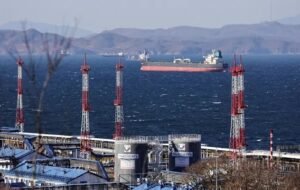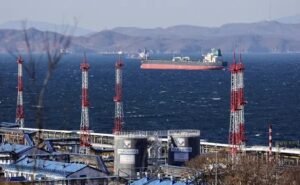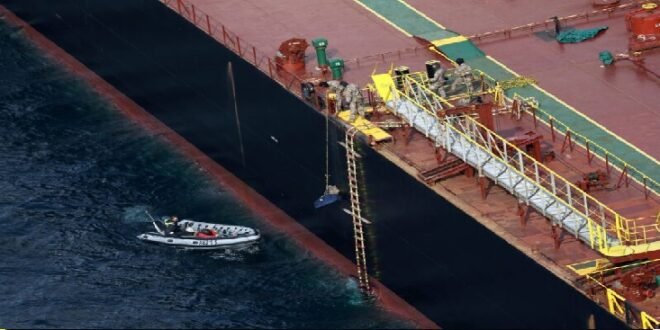22-10-2025
BRUSSELS: The European Union’s diplomatic arm, the EEAS, is urging member states to back a maritime declaration that would allow EU nations working with flag states to arrange inspections on Russia’s “shadow fleet” of oil tankers, an EEAS document shows.
 Beefing up inspection rights is the latest EU proposal aimed at curbing Russian oil and gas revenue being used by Moscow to finance the Ukraine war. EU foreign ministers are due to meet on Monday to discuss new measures against Russia, among other topics.
Beefing up inspection rights is the latest EU proposal aimed at curbing Russian oil and gas revenue being used by Moscow to finance the Ukraine war. EU foreign ministers are due to meet on Monday to discuss new measures against Russia, among other topics.
In early October, the Group of Seven industrialised economies (G7) agreed to work jointly towards this goal and target countries that help Moscow circumvent sanctions as well as those that have increased Russian oil imports.
“EU Member States increasingly demonstrate a renewed momentum for more robust enforcement actions tackling the shadow fleet (for example, France’s action against the Boracay vessel, previous actions by Estonia on Kiwala, Germany on Eventin and Finland on Eagle S),” the EEAS background paper said.
It said the draft declaration proposes “possible bilateral agreements between the flag states and the EU on pre-authorized boarding’s for inspections,” adding that an increase in fake flag registrations also needed tackling.
The EEAS said estimates put the shadow fleet at anywhere between 600 and 1,400, with Brussels sanctioning more than 400 ships as well as entities that enable the fleet to operate.
Once the EU adopts the 19th package of sanctions – likely within the next week – that figure will rise to about 560 vessels and bring forward a ban on Russian liquefied natural gas (LNG) imports by a year to Jan. 1, 2027. The EEAS said the bloc will also target tanker re-fueling services, so-called bunkering.
Last month, the European Commission proposed on Friday its 19th package of sanctions against Russia over its full-scale invasion of Ukraine in 2022. Member states will now have to discuss the package before adopting it unanimously.
 * A ban on Russian liquefied natural gas from Jan. 1, 2027, bringing forward the date from Jan. 1, 2028 that was proposed to member states via other legal texts.
* A ban on Russian liquefied natural gas from Jan. 1, 2027, bringing forward the date from Jan. 1, 2028 that was proposed to member states via other legal texts.
The EU banned trans-shipments of Russian LNG in a previous package.
The EU will list 118 new vessels in Moscow’s shadow fleet, bringing the total to over 560.
Ban on re-insuring listed vessels and reinsurance for used Russian aircraft
Ends exemptions for Russian oil companies Rosneft and Gazpromneft
List oil traders, refineries and petrochemical companies in third countries that breach sanctions including in China.
A full transaction ban on more Russian banks and their operations in third countries.
A full transaction ban on cryptocurrency platforms as well as restrictions on crypto-services for Russian nationals.
Restriction on the Russian credit card system (MIR) and fast payments system (SBP) EXPORT BANS.
Tighter export controls on an additional 45 Russian and third country entities, including in China and India.
Bans on chemicals, metal components, salts, and ores useful to Russia’s military.
Bans on investment in certain Special Economic Zones in Russia relevant for the war effort with the option to extend to list ports outside Russia used for weapons transfers or the shadow fleet.
Bans on high-tech services including geospatial information, AI, and high-performance computing.
Restrictions related to tourism in Russia. (Int’l Monitoring Desk)
 Pressmediaofindia
Pressmediaofindia




